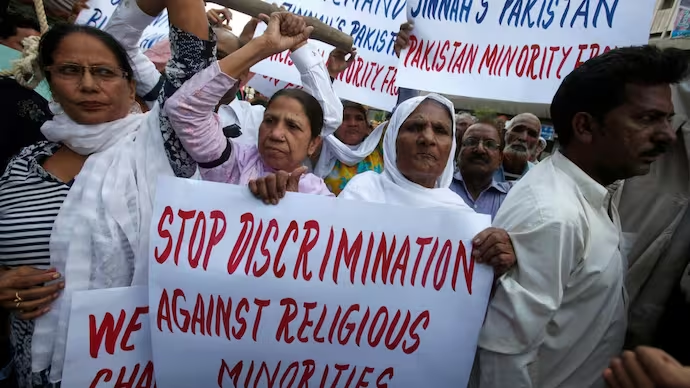
- The current federal budget of Pakistan for the fiscal year 2024-25 has been criticized for not allocating any amount for minority affairs programs.
- Minorities such as Hindus, Christians, and Ahmadis face significant discrimination and violence in Pakistan, with blasphemy laws remaining abused, leading to mob violence, long imprisonment, and deaths.
- Pakistan must address these challenges and protect the rights of minorities, ensuring proper funding and support, banning forced conversions, and safeguarding women from honour killings.
The current federal budget of Pakistan for the fiscal year 2024-25 has been criticized for not allocating any amount for minority affairs programs. This decision has caused a lot of people to ask questions about the religious liberties of persons in the country while at the same time showing that the issue of the rights of religious people is ignored and not acted upon.
No Money for Minorities in the Budget
In the previous financial year (2023-24), out of the total allotted funds, 100 million PKR was designated for the betterment of minorities including education, religious ceremonies, scholarships, and assistance. However, the 2024-25 budget surprisingly did not include any amount for minority development although its need was explained earlier. This omission has occurred at a time when minority groups particularly the Hindus, Christians and Sikhs are experiencing hard times and their population is reducing. These communities have minimal financial power, which worsens the challenges they face, including inadequate education, health care, violence, and discrimination.
However, where the Minority lacked welfare the budget was generous to other sectors of society. The budget was set at 1,861 million rupees for the Ministry of Religious Affairs and Interfaith Harmony, specifically for Haji pilgrims. Further, the Ministry of Defense Affairs and Services received a significant budget which was approximately 2.12 trillion PKR. These allocations raise an issue related to priorities that have been seen as problematic specifically about the concerns of minorities.
Religious Minorities: Dealing with Systemic Issues
Minorities like Hindus, Christians and Ahmadis are discriminated against and tortured in Pakistan. Blasphemy laws also remain abused as individuals are still persecuted, threatened, or attacked under the veil of blasphemy laws. They have led to mob violence, long imprisonments, and even deaths due to such accusations. An example of the risks that people take when such laws are in place is Patras Masih, who was accused of blasphemy and was subsequently tortured by the authorities. Hindu girls are especially at risk of enforced conversion and kidnapping; many underage girls have been forced to become Muslims and given in marriage against their wishes. Honour killings, another major issue, also specifically target women from minorities; problems like these shed light on the major gender and religious discrimination in the country.
Ethnic Minorities: Fighting For Rights and Recognition
Not to forget giving ethnic minorities a tough time in the country including Baloch, Muhajirs, Pushtuns, Sindhis and Kalasha. The Baloch people are mainly found in Balochistan province where they suffer political backwardness, unemployment, and neglect of their human rights. Muhajirs, who are Urdu-speaking people from India, experience ailments of urbanization and political marginalization. Due to terrorism and conflict, both Pushtuns and Sindhis experience violence The Kalash people living in Chitral, Pakistan, feel under threat as they are gradually losing their cultural identity.
Government Inaction and Lack of Accountability
The Pakistani government has been criticized for being ill-prepared to face these liabilities. Expression of unrest in policies and oppression of human rights activists, lawyers, and journalists have suppressed any form of dissent and oppressed ethnic minorities. Journalists arrested on seditious charges in connection to posts on social media and media houses being pressurised to tone down their reporting is counter-productive for a society that requires transparency and accountability.
But on the negative side, human rights abuses, torture, and extrajudicial killings are still observed especially by the security forces agencies where minorities are usually at the receiving end. When there is no response from the government to address any wrongdoing that occurs in the law enforcement agencies that focus on minorities, then the sense of insecurity is heightened for the targeted groups.
Recent Incidents Show the Grim Reality
Some of the recent acts include the desecration of a Hindu temple in Karak, Khyber Pakhtunkhwa in December 2020 and the persistent violence against the Ahmadiyya sect. Shias are also a minority and they have also suffered from sectarian violence and their religious places have only recently become targets.
Conclusion
Therefore, it is an important time for the authorities in Pakistan to address these challenges and protect the rights of minorities in Pakistan. It was stated that blasphemy laws require political protection from abuse, forced conversion should be banned and women from honour killings should be safeguarded. There is also a need for better protection of minorities by the government; proper funding and support; as well as education and sensitization.
It is, therefore, possible for the international community to support Pakistan in these endeavours while at the same time pressing the government of the country to appreciate minorities. So, Pakistan should come to realize that for it to establish such a society for every single person irrespective of their religious or other affiliations, the country needs to take consistent and sustained action.
